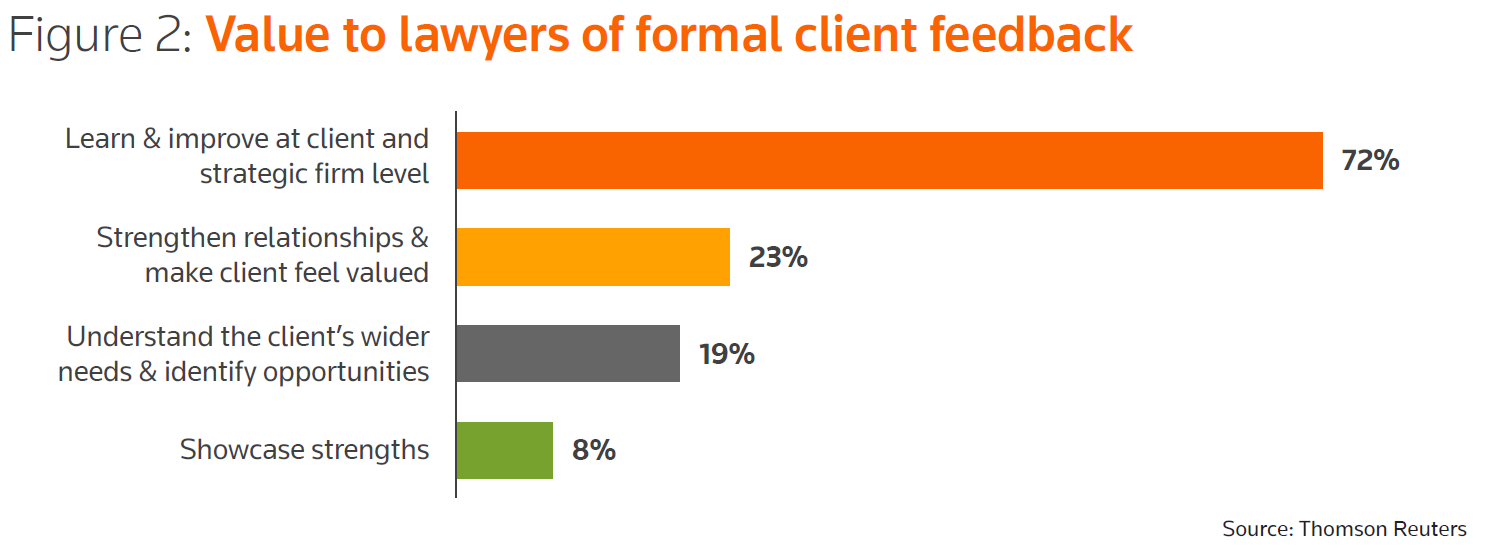In the first in a new series of "Stellar Performance Research" reports, we will look how Thomson Reuters stand-out lawyers regard the value of client feedback programs
For many lawyers, there may be no more important factor to improving their performance and skill level than gaining consistent feedback from their clients.
While partners and associates may often receive useful feedback from those more senior to them within their law firm, including from firm leadership, it is only the feedback that lawyers receive from clients that can let those lawyers know if they are truly succeeding in serving their clients well.
In a new series of Stellar Performance Research reports, we will look at the experiences that Thomson Reuters stand-out lawyers have had with such critical topics as client feedback, recruitment and retention, lawyer engagement, and collaboration.
In our first report we look at formal client feedback programs. Indeed, our group of stand-out lawyers have, in one sense, already been given one very satisfying form of feedback — they’ve been nominated as stand-out lawyers by their clients.
Even given this level of accolade, these lawyers still have seen the inherent value of a formal client feedback program, which often can provide critical information and insight into their clients’ minds that these lawyers would otherwise not have been able to access.

Not surprisingly, the report shows that a large majority (72%) of the stand-out lawyers interviewed said that the biggest value they see in formal client feedback programs is the ability to learn and improve at a client and strategic firm level. Other crucial benefits to these programs in the lawyers’ eyes include the ability to strengthen relationships and make clients feel valued, as well as understand clients’ wider needs and identify further opportunities to serve clients.
Despite this clear value paradigm, only about 27% of clients say they have been asked for feedback by their outside law firms. And, as the report points out, that is a big missed opportunity for law firms.
That’s because clients who take part in their outside law firms’ formal feedback programs are more likely — a full nine percentage points more — to recommend those law firms and spend more than twice the portion of their budgets with those firms. “Clients often say, ‘I’ve never been asked or been given the opportunity to do this before’ and are really positive about it,” says one U.K. equity partner, responding to the survey.
And there are additional benefits to the lawyers involved as well. In fact, the report demonstrates that those lawyers whose clients go through formal feedback programs are more engaged themselves and more likely to be better ambassadors for their firms. Further, two-thirds of partners say these client feedback programs are highly valuable, and give the firm honest, actionable feedback about its strengths and weaknesses, as well as opportunities to win additional client work.
Clients who take part in their outside law firms’ formal feedback programs are more likely — a full nine percentage points more — to recommend those law firms and spend more than twice the portion of their budgets with those firms.
Of course, the report also discusses the barriers to the successful implementation of formal client feedback programs within a law firm, including resource constraints — both in terms of personnel and capital — and questions over how the program will be managed and what will be done with the information gleaned from the client interviews.
Still, the report makes clear that the benefits of formal client feedback programs for law firms are many. However, firm leadership should also remember that while client feedback programs offer lawyers many opportunities to learn about, improve, and expand their client services, not all feedback is either negative or positive. Yet, as one French non-equity partner said, simply “having confirmation of client satisfaction is a powerful motivator” for lawyers and the firm.
And that in itself may persuade at least some partners to get on board with the establishment of a formal client feedback program within their firm.







